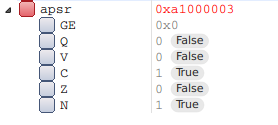Hi
I am trying to implement a lightweight algorithm on nRF52832 Development Kit. When I try to debug the code, it shows "unknown function at address "0x00000A60". I am attaching the code.
#include "ascon_api.h"
#include "ascon_endian.h"
#include "ascon_permutations.h"
#include "nrf_log.h"
#define RATE (128 / 8)
#define PA_ROUNDS 12
#define PB_ROUNDS 8
#define IV \
((u64)(8 * (CRYPTO_KEYBYTES)) << 56 | (u64)(8 * (RATE)) << 48 | \
(u64)(PA_ROUNDS) << 40 | (u64)(PB_ROUNDS) << 32)
int ascon_crypto_aead_encrypt(unsigned char* c, unsigned long long* clen,
const unsigned char* m, unsigned long long mlen,
const unsigned char* ad, unsigned long long adlen,
const unsigned char* nsec, const unsigned char* npub,
const unsigned char* k) {
u32_2 K0, K1, N0, N1;
u32_2 x0, x1, x2, x3, x4;
u32_2 t0, t1;
u64 tmp0, tmp1;
u32 i;
(void)nsec;
// set ciphertext size
*clen = mlen + CRYPTO_ABYTES;
// load key and nonce
to_bit_interleaving(K0, U64BIG(*(u64*)k));
to_bit_interleaving(K1, U64BIG(*(u64*)(k + 8)));
to_bit_interleaving(N0, U64BIG(*(u64*)npub));
to_bit_interleaving(N1, U64BIG(*(u64*)(npub + 8)));
// initialization
to_bit_interleaving(x0, IV);
x1.o = K0.o;
x1.e = K0.e;
x2.e = K1.e;
x2.o = K1.o;
x3.e = N0.e;
x3.o = N0.o;
x4.e = N1.e;
x4.o = N1.o;
P12();
x3.e ^= K0.e;
x3.o ^= K0.o;
x4.e ^= K1.e;
x4.o ^= K1.o;
// process associated data
if (adlen) {
while (adlen >= RATE) {
to_bit_interleaving(t0, U64BIG(*(u64*)ad));
x0.e ^= t0.e;
x0.o ^= t0.o;
to_bit_interleaving(t1, U64BIG(*(u64*)(ad + 8)));
x1.e ^= t1.e;
x1.o ^= t1.o;
P8();
adlen -= RATE;
ad += RATE;
}
tmp0 = 0;
tmp1 = 0;
for (i = 0; i < adlen; ++i, ++ad)
if (i < 8)
tmp0 ^= INS_BYTE64(*ad, i);
else
tmp1 ^= INS_BYTE64(*ad, i % 8);
if (adlen < 8)
tmp0 ^= INS_BYTE64(0x80, adlen);
else
tmp1 ^= INS_BYTE64(0x80, adlen % 8);
to_bit_interleaving(t0, tmp0);
x0.e ^= t0.e;
x0.o ^= t0.o;
to_bit_interleaving(t1, tmp1);
x1.e ^= t1.e;
x1.o ^= t1.o;
P8();
}
x4.e ^= 1;
// process plaintext
while (mlen >= RATE) {
to_bit_interleaving(t0, U64BIG(*(u64*)m));
x0.e ^= t0.e;
x0.o ^= t0.o;
to_bit_interleaving(t1, U64BIG(*(u64*)(m + 8)));
x1.e ^= t1.e;
x1.o ^= t1.o;
from_bit_interleaving(tmp0, x0);
*(u64*)c = U64BIG(tmp0);
from_bit_interleaving(tmp1, x1);
*(u64*)(c + 8) = U64BIG(tmp1);
P8();
mlen -= RATE;
m += RATE;
c += RATE;
}
tmp0 = 0;
tmp1 = 0;
for (i = 0; i < mlen; ++i, ++m)
if (i < 8)
tmp0 ^= INS_BYTE64(*m, i);
else
tmp1 ^= INS_BYTE64(*m, i % 8);
if (mlen < 8)
tmp0 ^= INS_BYTE64(0x80, mlen);
else
tmp1 ^= INS_BYTE64(0x80, mlen % 8);
to_bit_interleaving(t0, tmp0);
x0.e ^= t0.e;
x0.o ^= t0.o;
to_bit_interleaving(t1, tmp1);
x1.e ^= t1.e;
x1.o ^= t1.o;
from_bit_interleaving(tmp0, x0);
from_bit_interleaving(tmp1, x1);
for (i = 0; i < mlen; ++i, ++c)
if (i < 8)
*c = EXT_BYTE64(tmp0, i);
else
*c = EXT_BYTE64(tmp1, i % 8);
// finalization
x2.e ^= K0.e;
x2.o ^= K0.o;
x3.e ^= K1.e;
x3.o ^= K1.o;
P12();
x3.e ^= K0.e;
x3.o ^= K0.o;
x4.e ^= K1.e;
x4.o ^= K1.o;
// set tag
from_bit_interleaving(tmp0, x3);
*(u64*)c = U64BIG(tmp0);
from_bit_interleaving(tmp1, x4);
*(u64*)(c + 8) = U64BIG(tmp1);
return 0;
}
The error comes in the last lines:
" from_bit_interleaving(tmp0, x3);
*(u64*)c = U64BIG(tmp0);
from_bit_interleaving(tmp1, x4);
*(u64*)(c + 8) = U64BIG(tmp1);"
When I try to run further, it shows me "Hard Fault Handler." Here is the apsr register value:


